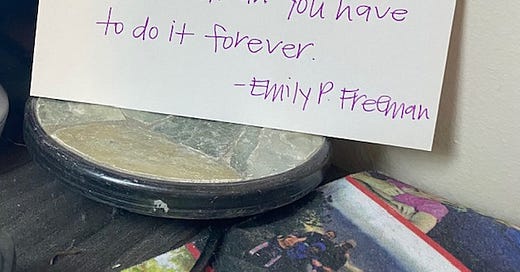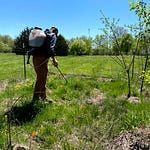Buried in Emily Freeman’s monthly newsletter was this gem that I immediately copied down and put on my desk. Over the past few years, I’ve been noticing repeated invitations to let go of some things that, while I might be good at doing them, are not serving me right now. These invitations were subtle at first, louder now.
I’ve been having to remind myself as I began to listen to these more urgent nudges that living seasonally applies to roles and talents too, meaning that just because a role works for a season (or twelve) doesn’t mean you can’t put it down. Your surrendering of it might be forever or for just a season.
I’m also discovering that there are some things that I became good at as a child or younger person out of some need to be loved or to be seen that are causing problems for me these days. It’s far easier to let go of things that are obviously detrimental to you, but it’s harder to let go of things that you feel that - or you’ve been told repeatedly that - you’re good at. It’s hard to let go of roles that you’ve played, sometimes for decades, that enable you to fit in with your family or a certain group.
Grant was an economics major, and he still reads intense economics books for fun (weirdo). I try to have a baseline understanding of economics so I don’t feel like a total idiot when he tries to explain what he is reading to me. One of the concepts that has been hugely helpful to me is the fallacy of sunk costs, typically discussed in terms of investments. According to this helpful explanation from The Decision Lab, the sunk cost fallacy “describes our tendency to follow through on an endeavor if we have already invested time, effort or money into it, whether or not the current costs outweigh the benefits.”
I have been realizing that I’ve been using this fallacy on myself: if I’ve put in this many hours at something to be good at it, I have to keep doing it. If I spent this much money to pursue something, I have to keep at it. If I’m talented at something, it must mean that I have to keep doing that thing.
But they call sunk costs a fallacy for a reason: they aren’t rational. Now I’m all for being irrational when the time is right, but in this case, I don’t want to be hamstrung by the past. I want to assess my present needs, desires, and hopes to determine how I want to spend my time and energy, instead of defaulting to what has earned me praise, money, or attention in the past.
This grounding season we’re in now is inviting me to consider what I’m doing because it’s good for me, my people, and our place — and what I’m doing out of expectation or obligation. There’s a place for expectation and obligation, of course, but I don’t want to live my whole life there.
Rants and raves
👍 I’m almost finished with an advanced copy of my friend Victoria’s new book, Church of the Wild, and I think everyone who grew up even adjacent to the church should read it. I’ve been sick of the capital “C” church throughout the pandemic, but Victoria’s book has given me some inspiration that a new (old) way is possible.
👍 The new season of Modern Love. We are only three episodes in, but I love this concept so much.
👍 Quitting things. See above for more explanation, but 'I’ve quit or said no to a handful of things in the last month that I was struggling with - and it feels really good on the other side of those decisions (just in case you need a little push to quit something too).
👎 One of my continual pet peeves is the use of Roundup and chemical fertilizers on lawns because of how it affects all of our air, water, and soil quality (not to mention that perfectly manicured lawns in general are a stupid idea sold to Americans by chemical companies). This story of a man who died after being turned away from 43 ICUs that are at capacity because of Covid made me ragey because it’s the same thought process as the people that dump chemicals on their lawns and the root cause of our uniquely American sickness: death by individualism.
Stuff worth sharing this week
I loooved this conversation between Brené and Amy Cuddy on pandemic flux syndrome. It helped me feel a little more sane and level-set expectations going into the fall. Also, I just want to be friends with Amy.
I always make time for Courtney Martin’s newsletter, but this one was especially good. I’ve been sitting with the L’Engle question Martin quotes since I read it and still stewing on what my own answers might be. The question is" “When are you the most you?” and this seems like the perfect question to sit with as we approach the Fall Equinox next week.
My August what I’m loving and learning post in case you missed it.
Cheers to setting something down in the week ahead!
Sara
Know someone who might like this sort of thing? Sharing is caring, as they say, and a wonderful way to support writers you appreciate in the meantime.















Share this post